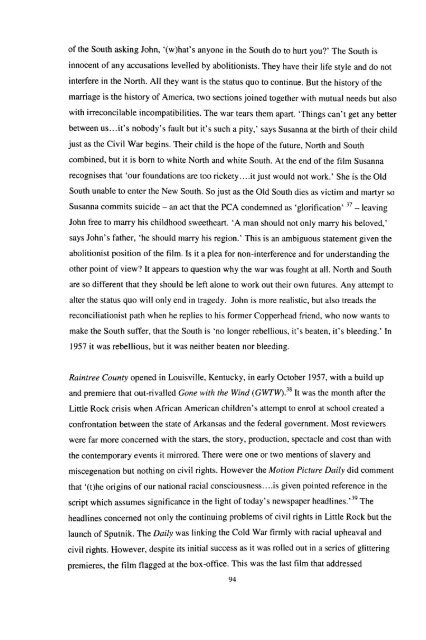Download (3483kB) - Greenwich Academic Literature Archive ...
Download (3483kB) - Greenwich Academic Literature Archive ...
Download (3483kB) - Greenwich Academic Literature Archive ...
- No tags were found...
You also want an ePaper? Increase the reach of your titles
YUMPU automatically turns print PDFs into web optimized ePapers that Google loves.
of the South asking John, '(w)hat's anyone in the South do to hurt you?' The South isinnocent of any accusations levelled by abolitionists. They have their life style and do notinterfere in the North. All they want is the status quo to continue. But the history of themarriage is the history of America, two sections joined together with mutual needs but alsowith irreconcilable incompatibilities. The war tears them apart. Things can't get any betterbetween us...it's nobody's fault but it's such a pity,' says Susanna at the birth of their childjust as the Civil War begins. Their child is the hope of the future, North and Southcombined, but it is born to white North and white South. At the end of the film Susannarecognises that 'our foundations are too rickety....it just would not work.' She is the OldSouth unable to enter the New South. So just as the Old South dies as victim and martyr soSusanna commits suicide - an act that the PCA condemned as 'glorification' 37 - leavingJohn free to marry his childhood sweetheart. 'A man should not only marry his beloved,'says John's father, 'he should marry his region.' This is an ambiguous statement given theabolitionist position of the film. Is it a plea for non-interference and for understanding theother point of view? It appears to question why the war was fought at all. North and Southare so different that they should be left alone to work out their own futures. Any attempt toalter the status quo will only end in tragedy. John is more realistic, but also treads thereconciliationist path when he replies to his former Copperhead friend, who now wants tomake the South suffer, that the South is 'no longer rebellious, it's beaten, it's bleeding.' In1957 it was rebellious, but it was neither beaten nor bleeding.Raintree County opened in Louisville, Kentucky, in early October 1957, with a build upand premiere that out-rivalled Gone with the Wind (GWTW). 3 * It was the month after theLittle Rock crisis when African American children's attempt to enrol at school created aconfrontation between the state of Arkansas and the federal government. Most reviewerswere far more concerned with the stars, the story, production, spectacle and cost than withthe contemporary events it mirrored. There were one or two mentions of slavery andmiscegenation but nothing on civil rights. However the Motion Picture Daily did commentthat '(t)he origins of our national racial consciousness....is given pointed reference in thescript which assumes significance in the light of today's newspaper headlines.' 39 Theheadlines concerned not only the continuing problems of civil rights in Little Rock but thelaunch of Sputnik. The Daily was linking the Cold War firmly with racial upheaval andcivil rights. However, despite its initial success as it was rolled out in a series of glitteringpremieres, the film flagged at the box-office. This was the last film that addressed94
















